In the never-ending effort to better understand the customers, marketers are always finding new technologies and insights on how to apply them. In this pursuit, artificial intelligence (AI) has emerged as a game-changer.
AI has completely changed how businesses function, making data-driven decisions simpler than ever. AI’s transformative potential has captured the attention of marketing professionals, as it offers exceptional opportunities to optimize marketing operations, improve customer experiences, and spur business growth. From personalized experiences to predictive analytics, AI has become a “must” for marketing teams looking to maximize their full potential.
Enhanced Customer Insights
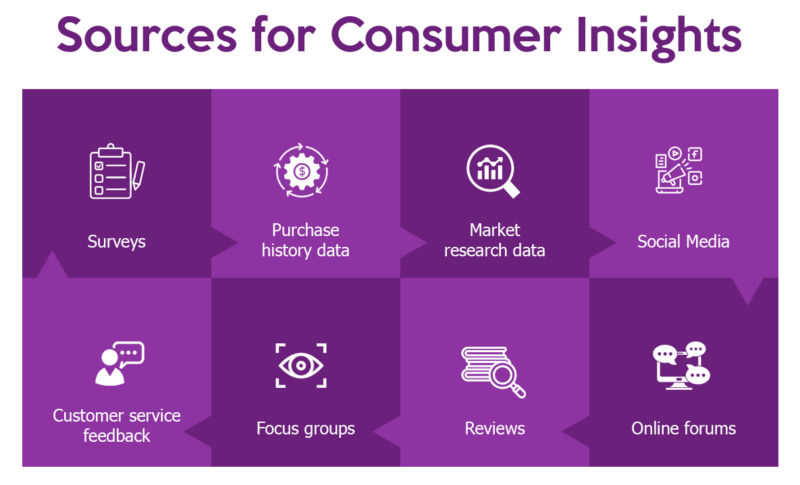
Consumer insights are the result of the combination of several elements, including surveys, purchase history data, market intelligence, research, customer service feedback, reviews, loyalty analysis, and other aspects. It provides businesses with the opportunity to effectively customize and tailor their products or services to the needs, wants, and requirements of their customers. Understanding customers’ motivations and anticipating their behavior can speed up and amplify growth.
A report by Microsoft Dynamics 365 revealed that organizations that leverage their customer behavior data to generate insights outperform peers by 85% in sales growth.
When applied properly to ai marketing strategy, AI can assist in providing customer insights that provide a thorough understanding of buying behavior, needs, likes, dislikes, and preferences. Do you know what motivates your customers to purchase your products or services? Do you know how many customers are dissatisfied with your business and looking at competitors? How do you intend to keep them around? Customer insight is necessary to answer these questions.
Among the main advantages of consumer insights are:
- It facilitates personalized messaging
- It raises brand awareness among relevant audience pools
- It can target the most valuable groups of customers
- It can help brands entering new markets with their current products
Businesses can obtain insights into consumer behavior, interests, and needs by using AI-powered analytics. Large volumes of customer data are analyzed using AI analytics, which uses cutting-edge algorithms and machine-learning approaches to identify relevant patterns and trends. Here’s how businesses can use AI for deep customer understanding:
Personalization
One survey revealed that 80% of customers are more likely to purchase from a company that offers personalized experiences. 69% of online shoppers said that the quality or relevance of a company’s message influences their perception of a brand.
With AI-based personalization, brands can boost customer engagement, loyalty, revenues, and a deeper understanding of their customers all in real time. By understanding individual preferences and behavior, businesses can make product recommendations, marketing messages, and offers that are relevant to each customer.
Sentiment Analysis
Sentiment analysis is the most common way of collecting and analyzing consumer insight. Also known as opinion mining, it is a natural language processing (NLP) technique used to determine whether a message is positive, negative, or neutral. Rather than simply counting the number of comments, sentiment analysis considers the emotions and opinions of people about a brand.
Here’s an example of sentiment analysis from customer reviews:
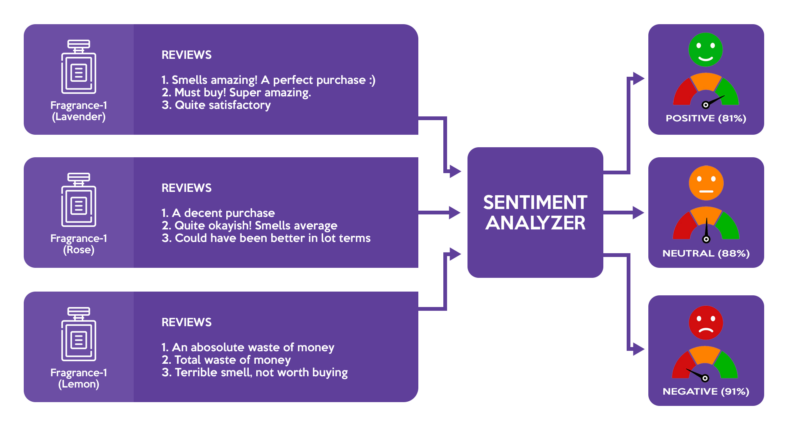
Customer Segmentation
Customer segmentation is a technique for grouping customers into separate sub-groups that often have different needs. AI may be used to customize consumer targeting by using data-driven algorithms to identify and create segments. These “segments” can be as straightforward as separating customers based on demographics like gender and age, or they may also be divided based on more complex factors such as past behaviors and buying personas.
Customer Lifetime Value (CLV) Analysis
Customer Lifetime Value (CLV, or CLTV) is a metric that indicates the total revenue a business can reasonably expect from a single customer account throughout the business relationship. With the use of AI and machine learning, businesses can better predict customer behavior and spending patterns, allowing them to focus their marketing efforts and increase customer retention. This can significantly increase CLV as loyal customers tend to spend more over time.
Automation and Efficiency
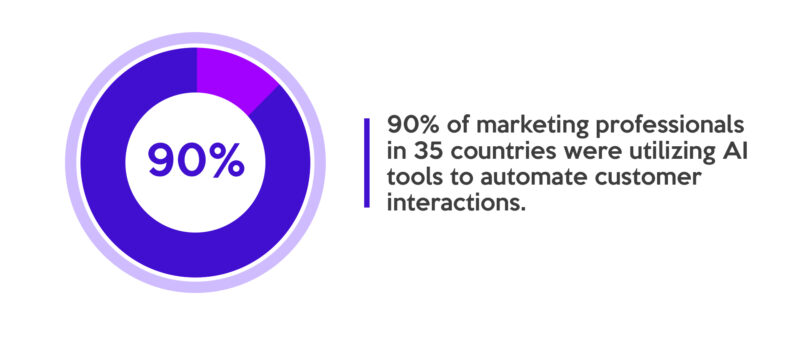
AI revolutionizes marketing automation and benefits marketers in a variety of ways. Marketing automation, also known as MA, is the process of automating marketing operations and workflows through the use of technology. When paired with AI, marketing technology streamlines and accelerates tasks.
On the State of AI, by Hubspot, 67% of the surveyed U.S. professionals said that the biggest benefit of using AI in digital marketing efforts is that it saves time and allows them to create content faster. Below are several ways in which AI can help with automation and efficiency.
Email automation
The most typical application of marketing automation is email. Since email was among the first mass communication channels to be entirely digital, marketers looked for automation to handle the enormous amount of messages they need to send. Email automation tools have the ability to schedule an email to be sent at a specific time, and on some advanced solutions, it can even be sent based on the customer’s time zone.
An email AI platform can also assist with email sequencing and triggering based on customer activity. An example of this is sending out an email reminder to customers who did not complete a purchase and have items in their shopping carts.
Improved lead generation and conversion
AI can automate the time-consuming process of lead scoring and nurturing by evaluating lead data to determine which prospects are most likely to become actual customers. AI helps marketers to identify high-quality leads and predict conversion likelihood through lead-scoring models. By doing this, businesses may increase the quality of their leads while saving time and resources.
AI algorithms can determine which marketing channels are most effective and may allocate resources accordingly by analyzing data on the performance of various channels. This may result in more effective marketing campaigns and improved business outcomes.
AI chatbots
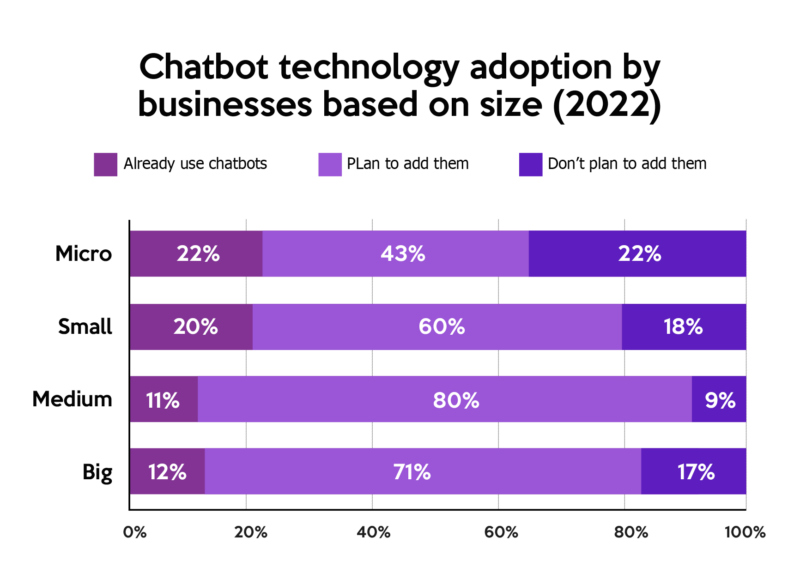
AI-powered chatbots can mimic human interaction to offer customer support and interact with clients in real-time. They can process orders, offer advice on products, and respond to frequently asked questions. Businesses can increase customer satisfaction and save time and costs by using chatbots instead of doing manual customer support tasks.
Predictive Analytics and Decision-Making
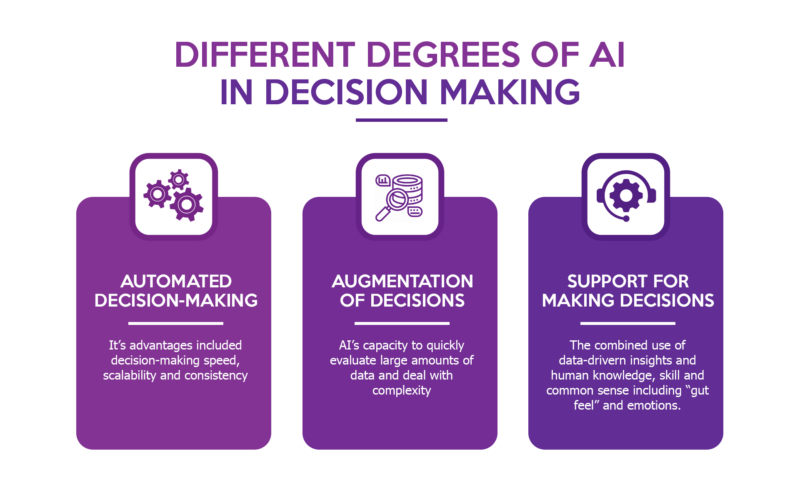
With businesses and organizations looking to improve their decision-making processes, artificial intelligence (AI) play an increasingly important role in predictive analytics. Predictive analytics is a type of data analysis that uses statistical techniques, algorithms, and machine learning models to analyze past and current data to make accurate forecasts about future behavior or events. Incorporating AI in this process allows businesses to gain more insights and make better decisions.
It can be used to answer a vast array of questions like:
- How many units of product X will be sold next month?
- Which customers are likely to leave within the next 30 days?
- Based on their prior behavior and preferences, which customers are most likely to be interested in new products or services?
- Which leads are more likely to convert into paying customers?
- Which transactions are most likely to be fraudulent?
Using traditional statistical approaches to analyze and interpret data can be labor- and time-consuming. On the other side, AI can automate much of the process, enabling businesses to analyze huge data sets in real time and make decisions based on the most recent information available.
Additionally, AI improves predictive analytics by bringing a level of accuracy and precision that used to be unattainable. Machine learning algorithms can spot patterns and trends in data that human analysts would not instantly notice. Its ability to learn, adapt, and improve over time is a great advantage for businesses wanting to stay ahead in their respective industries.
Improved Customer Experience
According to Microsoft: “A moderate increase in customer experience generates an average revenue increase of $775 million over three years for a company with $1 billion in annual revenues.”
AI provides personalized customer recommendations
By consistently learning from the data it analyzes, AI is able to forecast customer behavior. Due to its ability to deliver relevant content, organizations can provide customers with a perfect marketing offer, which may result in higher customer engagement and profits.
AI can address customer needs faster
AI-powered chatbots can respond to a range of customer inquiries, including questions about products, order status, and basic troubleshooting. They can also help customers with more complex queries by directing them to the appropriate resources or human agents. Because chatbots can handle several conversations at once, businesses can manage customer inquiries more easily.
AI provides predictive customer service
AI analytics can foresee demands, predict customer issues, and proactively provide solutions. By analyzing historical data and patterns, businesses can identify future service disruptions and take preventive actions to address issues before they arise. This increases customer satisfaction and lowers support costs.
Cost Efficiency
Here are several ways in which AI can be a cost-effective solution for a business.
Minimized Errors with AI
Implementing automation will logically result in a significant reduction in manual work. Human mistakes can cause companies a lot of money. Businesses that use marketing AI can reduce the number of mistakes made by employees. AI that has been trained on reliable data and is continuously improved to account for drift does not commit errors. AI can lower costs and increase productivity by reducing human error.
Maximized ROI
Using AI technology can not only help companies save money, but it can also help them maximize their return on investment. In a survey by Mckinsey, 63% of respondents report revenue increases from AI adoption in the business units where their companies use AI, with respondents from high performers nearly three times likelier than those from other companies to report revenue gains of more than 10%.
Reduced Operating Costs
Operating costs consist of the following components:
- Salary expenses
- Maintenance and repair costs
- Marketing costs
- Office rent
- Office supply costs
In some cases, an AI marketing tool can partially or even completely replace certain employees. Their tasks can be automated and their salaries are no longer a concern. This can be especially important for start-up businesses. A one-time investment in AI tools will probably be less taxing on the budget than bringing on a full-time employee.
Ethical Considerations and Challenges
Just like other technologies, there are ethical considerations to be aware of when using AI in marketing. Here are some of these considerations:
Privacy and Data Sharing
Personalized ads and campaigns for individual users is one of the main advantages of using AI in marketing. This level of personalization, however, relies on the collection and analysis of enormous amounts of data, which presents privacy issues.
Businesses should provide customers the choice to opt out of data collection if necessary and be open about how they collect and use that data. In 2019, Google was fined $170 million by the Federal Trade Commission for collecting personal information from children through Youtube and using it to profit by targeting them with ads. This incident emphasizes how important it is to protect customers’ privacy, especially children.
Bias in AI Algorithms
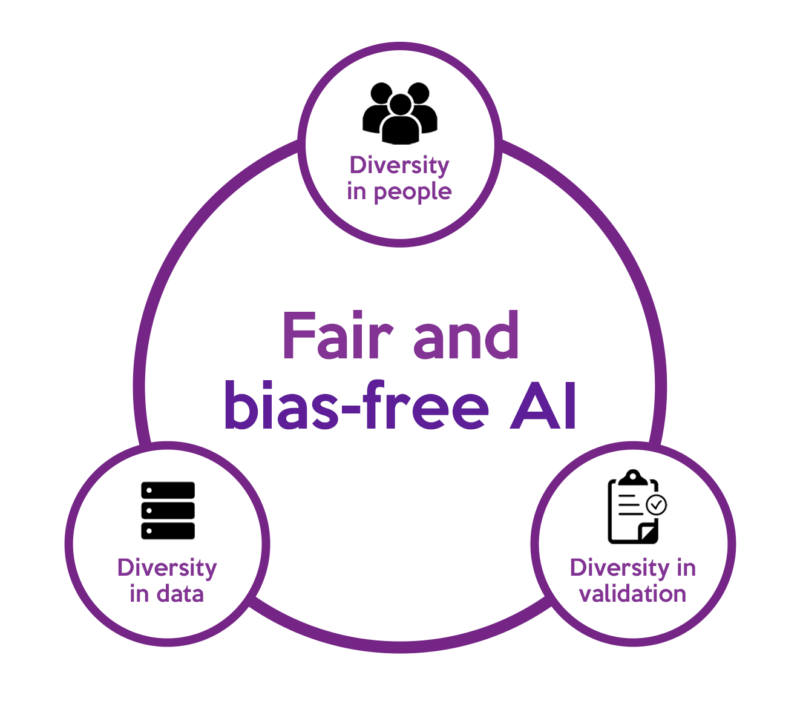
AI systems are dependent on the data it is trained on. Most often, the main source of bias is the underlying data rather than the algorithm itself. Because machine learning considers only the variables that improve its predictive accuracy based on the training data, AI can lessen the human’s subjective interpretation of data.
One famous instance of AI bias is the case of the Amazon recruitment tool, which was created to automate the hiring process by scanning resumes and ranking candidates. However, it was discovered that the tool was biased towards female candidates because it had been trained on resumes that were predominantly written by men. After learning the depth of the bias and the effects it had on the hiring process, Amazon was forced to cancel the project.
Businesses must ensure that their data is varied and representative, and they must regularly audit and test their AI systems in order to reduce the risk of bias in AI marketing.
The Impact on Employment
Although artificial intelligence significantly improves our world in many ways, there are notable concerns about how it will affect employment and the workforce in the future. For instance, predictions suggest that millions of people will be unemployed in the coming decades, mostly as a result of AI systems. Over time, some professions and occupations will lose significance, and finally obsolete.
However, artificial intelligence will play a supporting role in humans, enabling them to handle difficult and critical situations that require judgment and creative thinking. Numerous new roles and professions with an emphasis on science and technology would emerge concurrently.
Despite the risks associated with it, AI is here to stay and will undoubtedly continue to influence marketing in the future. It has emerged as an essential requirement for all marketing teams looking to effectively engage with their target audience. AI offers several advantages in marketing, including improved customer experience through personalized content, cost reductions, and streamlined processes resulting in efficiency.
It is essential to acknowledge that the successful integration of AI into marketing strategies requires a careful approach. To ensure the accuracy, privacy, and ethical use of customer data, marketing teams must invest in the appropriate AI marketing tools, platforms, and expertise, and establish strong data governance policies. Additionally, rather than completely replacing human responsibilities, AI should be seen as a complement to human expertise.
By embracing AI, marketing teams can open up new opportunities, gain a competitive edge, and influence the direction of marketing in an ever-evolving landscape.



Leave A Comment
You must be logged in to post a comment.